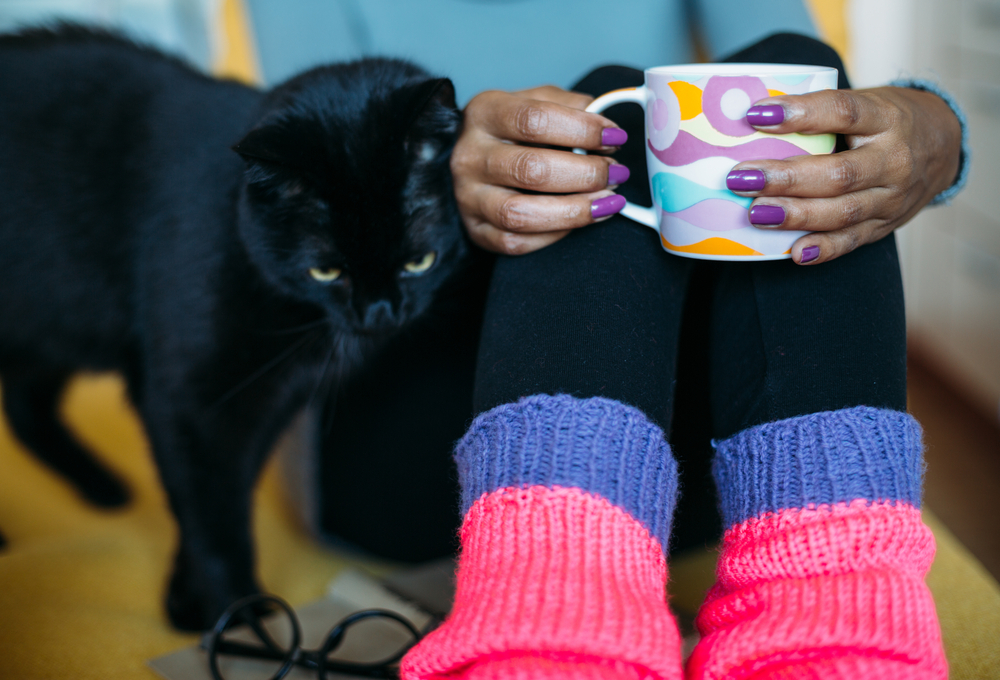We all know about studies showing that sharing life with a pet has beneficial effects on human health. Even a few minutes of petting a cat or dog can lower blood pressure and release mood-enhancing endorphins. A University of Minnesota study found that cat companionship may reduce the risk of heart attack for people by 30 percent.
Cats can help us stress less, but what do we do for them? If we’re stressed, our cats can get stressed right alongside us, even to the point of affecting their health. Because of their deep bond, people and pets often mirror each other’s physical and emotional states.
“Cats are sensitive creatures and affected by stress in similar ways humans are,” says Lynn Bahr, DVM, owner of Dezi & Roo, a company dedicated to designing and producing products that make cats happy. “And, just like people, stress lowers their bodies’ defenses, increases their chances of becoming ill, and negatively affects their physical and mental wellbeing.”
Ways Stress Affects Feline Health
Cats are sensitive by nature. Sometimes even a minor change in the environment, such as moving a piece of furniture, can cause stress. Things that may not seem stressful to a person can be perceived as extremely stressful by a cat, and the cat’s physiological reaction to the stressors can manifest as illness.
Stressors for cats include moving to a new home, home remodeling, a visit to the vet, a new baby in the family, a new cat or dog in the home, or sudden aggression between cats in the same household who have previously coexisted peacefully.
Cats are masters at hiding signs of illness, so their stress may not be evident immediately, but prolonged stress can gradually damage health. A landmark study conducted at Ohio State University in 2011 looked at how stress affects cats. The findings led to a new understanding among veterinarians and cat caregivers on the connection between environmental stress and urinary tract disease.
A more recent study in Seoul, South Korea, linked events such as living with other cats, lack of vertical space, and living in an apartment to increased risk of feline interstitial cystitis, an often painful inflammatory condition of the bladder and urinary tract.
How Stress Manifests
As both the Ohio State and Korean studies showed, a common outward sign of feline stress is inappropriate urination or spraying. While inappropriate elimination can be caused by a medical problem, frequently the underlying reason is stress. Chronic high stress levels can also affect the gastrointestinal system, the immune system, and the skin and coat.
“We know stress affects the whole neuro-endocrine immune access,” says Andrea Tasi, VMD, owner of Just Cats Naturally in Fairfax Station, Virginia. “When a cat has a ‘weak link’ in that system, that link will be affected by stress.”
Feline Stress Busting
Your veterinarian can be a partner in helping you manage your cat’s reaction to your stress.
“I treat many of my patients with stress-related illness preemptively once we have uncovered a stressor,” says Elizabeth Colleran, DVM, owner of The Chico Cat Hospital in Chico, California. “One patient of mine is deeply bonded to his human who periodically deploys in the military. We now know that one week before deployment we commence therapy to help her cope with his absence. Until we started doing that, Phoebe would ‘break’ with symptoms of FIC.”
Finding the human source of stress-related illness in cats is a combination of compassionate listening and detective work, Dr. Colleran says. Working together, you and your veterinarian can then find ways to help your cat relax.
To reduce stress in your cat’s life, keep the environment calm and consistent. Sprays or plug-ins containing feline-specific pheromones may help with situations such as inter-cat aggression, introducing a new cat or baby to the household, or other instances a cat may regard as a disruption of normal routine. Flower essences such as Rescue Remedy may also have a calming effect on cats (and humans) in stressful situations.
Equally important? Manage your own stress. We know that stress is bad for us, so don’t let it take something as drastic as a beloved cat getting sick before making changes to take better care of yourself.
This article was reviewed/edited by board-certified veterinary behaviorist Dr. Kenneth Martin and/or veterinary technician specialist in behavior Debbie Martin, LVT.








